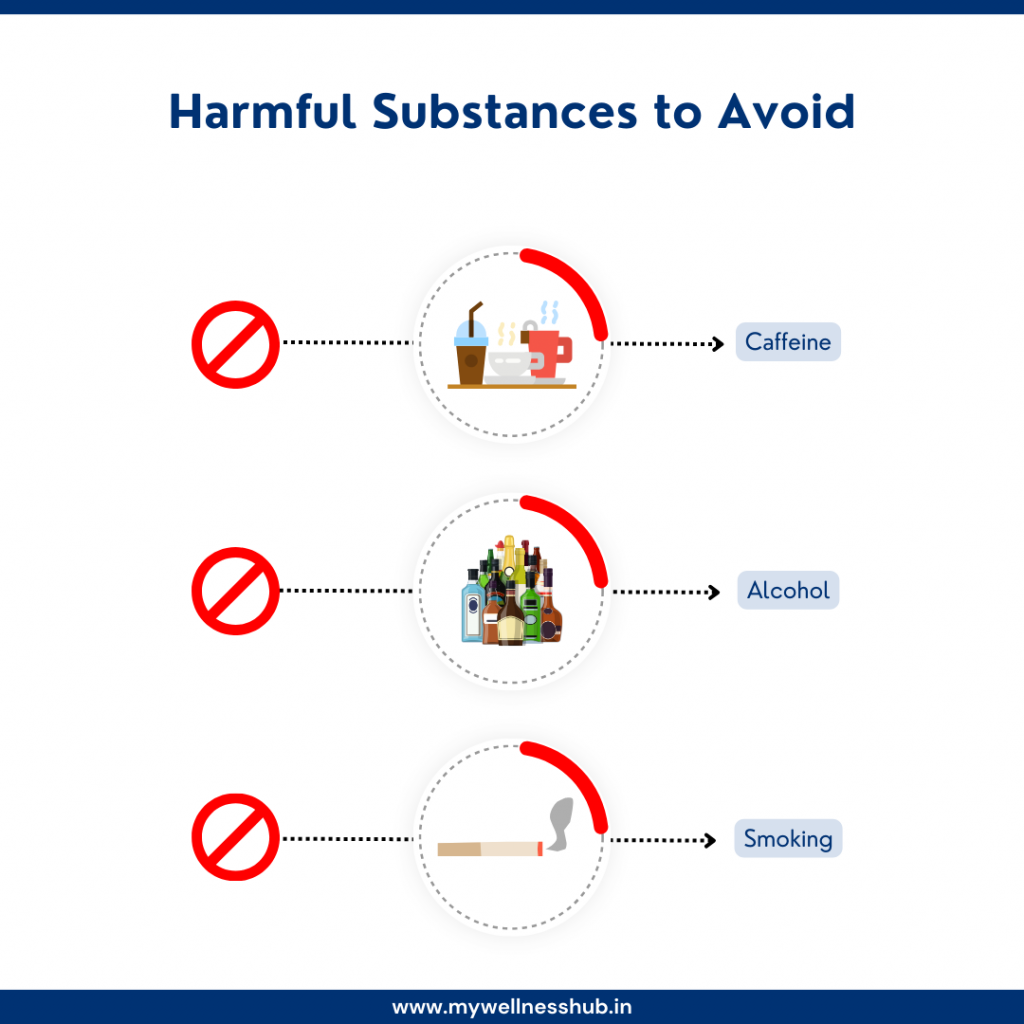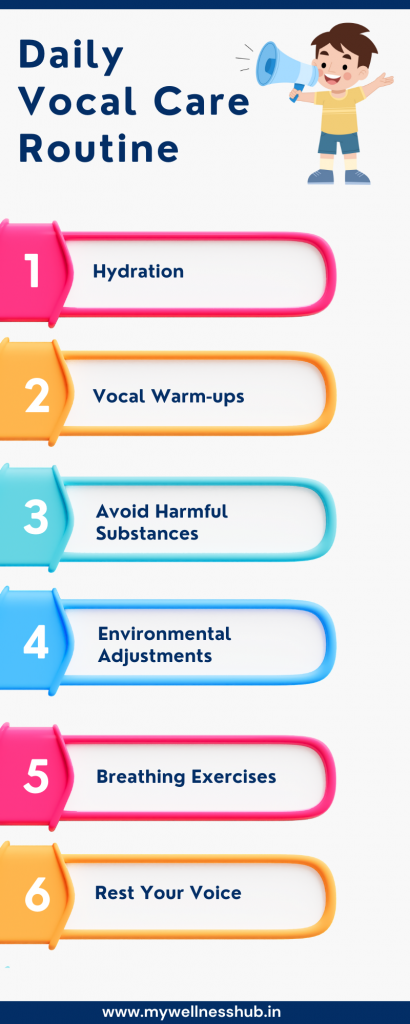Voice Care Secrets: How to Implement Effective Vocal Hygiene
By Rajini D
Last Updated: August 1, 2024
Have you ever considered how much you rely on your voice every day? From chatting with friends and colleagues to simply ordering a coffee, your voice is your constant companion and a primary tool for communication. However, it’s not just professional speakers, teachers, and singers who need to look after their vocal health—everyone does. Whether you use your voice for lively conversations, presentations at work, or cheering on your favorite team, maintaining good vocal hygiene is crucial.
Why is vocal hygiene so important, you ask? Simple daily practices can significantly improve the health of your vocal cords, enhancing both the quality and longevity of your voice. Just like brushing your teeth protects your dental health, taking care of your voice protects your ability to communicate effectively. It’s about ensuring clarity, strength, and resilience—attributes that can benefit you in every walk of life.
Book Your Speech Therapy Session Now
Understanding Vocal Hygiene
What exactly is vocal hygiene?
Think of it as a set of best practices aimed at keeping your voice box, or larynx, in top shape. Vocal hygiene involves habits that help maintain a healthy voice, ensuring it stays strong and clear for years to come. It’s not just about avoiding harm; it’s also about proactively nurturing your voice through positive daily actions.
The impact of good vocal habits on your long-term vocal health cannot be overstated. Regularly practicing good vocal hygiene can prevent common voice problems, such as hoarseness, strain, and even vocal nodules, which are often the bane of those who use their voices intensively without proper care. For instance, something as simple as staying hydrated can keep your vocal cords well-lubricated and reduce the risk of irritation.
Explore more about on our article The Vocalist’s Guide: Tips To Preserve Your Voice
Essential Tips for Maintaining Vocal Hygiene
Hydration: A Key to Vocal Health
One of the simplest yet most effective ways to maintain vocal hygiene is through proper hydration. Drinking enough water keeps your vocal cords adequately moisturized, helping them to move smoothly and reduce the risk of irritation or damage. Aim for at least 8 glasses of water a day, and remember, if you’re feeling thirsty, your vocal cords are already feeling the strain. Hydrated vocal cords can mean the difference between a clear, strong voice and a hoarse, strained one. Make water your best friend—it’s the easiest step you can take for a healthier voice.
Avoiding Harmful Substances
Certain substances can significantly compromise vocal health:
- Caffeine: Often found in coffee, tea, and many sodas, caffeine can dehydrate you, which is bad news for your vocal cords. Consider cutting back or opting for decaffeinated versions to help keep your voice in top shape.
- Alcohol: Like caffeine, alcohol is a diuretic, which dries out the vocal folds. If vocal health is a priority, it’s wise to limit alcohol consumption, especially before using your voice extensively.
- Smoking: This is perhaps the most harmful habit for vocal health. Smoking not only leads to long-term damage like cancer but also irritates and inflames the vocal cords. Quitting smoking can significantly improve your vocal quality and overall health
Transitioning away from these substances can be challenging, but your voice and your body will thank you. Try substituting harmful habits with healthier ones, like drinking herbal teas instead of coffee or engaging in stress-relief practices that don’t involve smoking or drinking.
Also Read: Food affecting your stress in all the ways | know more how food affects your mood
Comparison of Harmful Substances
| Substance | Effects on Vocal Health | Recommended Alternatives |
|---|---|---|
| Caffeine | Dehydrates the vocal cords, leading to dryness | Herbal teas, decaffeinated coffee, water |
| Alcohol | Dehydrates the larynx, causes thickening of mucus | Non-alcoholic beverages, water |
| Smoking | Causes vocal cord inflammation, increases cancer risk | Nicotine patches, smoking cessation programs |
Optimizing Your Environment
The environment in which you use your voice can also affect its health. Consider these factors:
- Humidity: Dry air can sap moisture from your vocal cords, leading to irritation. Using a humidifier, especially in dry climates or heated indoor environments, can help maintain the necessary humidity levels to keep your vocal cords functioning optimally.
- Noise: Constantly raising your voice to compete with background noise can strain your vocal cords. Try to manage the noise level in your environment use soft furnishings that absorb sound, close windows against noisy streets, and use microphones when speaking in noisy or large spaces.
Practices to Avoid to Protect Your Voice
While understanding what to do is crucial for maintaining vocal health, it’s equally important to know what not to do. Some common habits can severely strain or damage your vocal cords. Let’s explore these practices and discover healthier alternatives to ensure your voice stays strong and clear.

Harmful Practices and Their Alternatives
- Shouting and Loud Speaking: Continuously raising your voice to be heard over noise or in conversation can lead to vocal strain and damage.
- Alternative: Use a microphone in noisy environments or when addressing a group. Also, try to maintain a moderate speaking volume and take breaks during long conversations to give your voice a rest.
- Excessive Throat Clearing: This common habit can irritate the vocal cords because it forces them to slam together harshly. Repeated clearing can lead to swelling and damage.
- Alternative: If you feel the urge to clear your throat, try taking small sips of water or swallow gently. You can also try a gentle, breathy cough that doesn’t force the vocal cords together as violently.
- Whispering: Contrary to popular belief, whispering can strain your voice more than soft speaking. When you whisper, your vocal cords are still engaging in a strained way.
- Alternative: If you need to conserve your voice, speak softly in your normal tone rather than whispering. This method is less taxing on your vocal cords.
Daily Vocal Care Techniques
To keep your voice at its best, incorporating specific daily vocal care techniques into your routine can be incredibly beneficial. These habits are easy to adopt and can significantly enhance the health and longevity of your voice, especially if you rely heavily on vocal communication in your daily life.

Simple Exercises to Incorporate into Your Daily Routine
- Humming: Start your day with gentle humming to warm up your vocal cords. This can be done during your morning shower or while preparing breakfast. The vibrations help increase circulation in the throat and prepare the voice for the day ahead.
- Vocal Stretching: Much like stretching your body before a workout, vocal stretches help prevent strain. Practice gentle glides up and down your vocal range on different vowel sounds, such as “ah” or “ee,” which can help maintain flexibility in the vocal cords.
- Breathing Exercises: Proper breath support is crucial for vocal health. Spend a few minutes each day practicing deep breathing techniques. Inhale slowly through your nose, hold for a few seconds, and exhale slowly. This not only supports healthy voice use but also reduces stress.
Importance of Warming Up the Voice
Before any extensive vocal use, such as a presentation, a meeting, or a performance, warming up the voice is essential. Here’s why:
- Prevents Injury: Just like athletes need to warm up to prevent injuries, vocalists need to prepare their vocal cords to prevent strain and damage.
- Enhances Performance: A good vocal warm-up improves the quality of the sounds produced, ensuring clarity and reducing the likelihood of a hoarse voice later.
Examples of Effective Vocal Warm-ups
- Lip Trills: This involves rolling your lips together while making a sound. It helps relax the lips, face, and vocal cords while improving breath control.
- Tongue Trills: Similar to lip trills, but with the tongue rolling against the roof of your mouth. It helps reduce tension in the tongue and throat.
- Scales: Singing scales gently can help stretch the vocal cords and get them ready for use. Start softly and increase your volume gradually.
Recognizing and Addressing Vocal Strain
It’s crucial for anyone who relies on their voice regularly to recognize the early signs of vocal strain. By identifying these signs early, you can take steps to prevent further damage and maintain vocal health. Here’s how you can spot vocal strain and what actions to take if you find yourself experiencing these symptoms.
Identifying Signs of Vocal Strain
Vocal strain often manifests through a variety of symptoms, which might vary from subtle to more evident changes. Pay attention to the following signs:
- Hoarseness or a Raspy Voice: If your voice suddenly sounds breathy, rough, or scratchy, it could be an indicator of strain.
- Vocal Fatigue: Feeling like it takes more effort to speak or sing, or your voice quickly becomes tired could mean you are experiencing vocal fatigue.
- Loss of Vocal Range: Difficulty hitting high notes that you could sing or reach before without strain.
- Frequent Throat Clearing: A constant urge to clear your throat can indicate inflammation or irritation.
- Voice Breaks or Cracking: When your voice unpredictably cracks or breaks, especially outside of adolescent voice changes.
- Discomfort or Pain: Any form of pain or a constant sore throat when using your voice is not normal.
Steps to Take When Experiencing Symptoms of Vocal Fatigue or Discomfort
If you notice any of the above symptoms, it’s important to take immediate steps to alleviate and address the strain:
- Voice Rest: Give your voice a break. This doesn’t just mean not singing; it means speaking less and avoiding whispering which can strain your voice even more.
- Hydration: Increase your fluid intake. Keeping the vocal cords hydrated helps to reduce irritation and allows them to heal more quickly.
- Humidify Your Environment: Using a humidifier, especially in dry climates or heated indoor environments, can add moisture to the air and help soothe dry vocal cords.
- Avoid Harmful Habits: Refrain from smoking, alcohol, and caffeine, all of which can exacerbate vocal problems.
- Warm-Up Gently: Once symptoms start to lessen, gently warm up your voice before extensive use to avoid further strain.
- Seek Professional Advice: If symptoms persist, consider consulting a speech therapist or an ENT specialist. Persistent issues might require professional intervention to prevent long-term damage.
Daily Vocal Care Checklist
| Daily Vocal Care Checklist | Content |
|---|---|
| Hydration | Drink 8 glasses of water daily. |
| Warm-up | Perform vocal warm-up exercises for 10 minutes. |
| Avoiding Harmful Substances | Eliminate caffeine, alcohol, and smoking from your routine. |
| Environmental Factors | Maintain 40% humidity in your environment. |
When to Seek Professional Help
Recognizing when a vocal issue requires more than just rest and home remedies is crucial for long-term vocal health. Sometimes, despite our best efforts with self-care and preventative measures, professional evaluation and treatment are necessary. Here’s how you can tell it’s time to seek help from a speech therapist or other health professional, and why doing so can be a pivotal step in preserving your vocal health.
Recognizing Serious Vocal Issues
Persistent or recurrent symptoms can indicate underlying problems that might require professional intervention. Consider consulting a healthcare provider if you experience:
- Persistent Hoarseness or Voice Changes: If hoarseness or alterations in your voice last longer than two weeks without improvement, it’s important to seek professional advice.
- Pain or Discomfort: Vocal use should not be painful. If you experience persistent throat pain, discomfort while speaking or swallowing, it’s time to consult a professional.
- Frequent Throat Clearing with Discomfort: While occasional throat clearing is normal, frequent clearing accompanied by discomfort or a sensation of something being stuck in the throat could indicate a problem.
- Loss of Vocal Range: Particularly for singers, a noticeable and persistent loss of range could be a sign of vocal fold damage.
- Vocal Fatigue: If your voice tires easily and doesn’t recover with rest, this fatigue could be a sign of vocal strain or misuse that requires professional attention.
The Role of Speech Therapists
Speech therapists specialize in diagnosing and treating voice disorders. They work with you to develop personalized strategies for voice management and recovery, which may include:
- Vocal exercises: Tailored exercises to strengthen your vocal cords and improve your voice quality.
- Behavior modification: Techniques to change how you use your voice day-to-day to reduce strain.
- Therapeutic treatments: Sometimes, more direct interventions are necessary, and a speech therapist can guide these processes.
Conclusion
Taking care of your voice is crucial, not just for singers or speakers, but for everyone. Simple steps like staying hydrated, avoiding harmful substances, and using your voice wisely can make a big difference in maintaining vocal health. By making these practices part of your daily routine, you ensure your voice stays strong, clear, and vibrant.
At Wellness Hub, we’re dedicated to supporting your overall well-being, including your vocal health. We offer valuable resources and expert advice to help you care for your voice. We encourage you to use the tips from this article and explore our Voice Care Resources for further support. Remember, a healthy voice enhances your quality of life, and we’re here to help you achieve that.
Frequently Asked Questions:
1. What is vocal hygiene and why is it important?
Vocal hygiene refers to practices and habits that help maintain the health and function of your voice. Good vocal hygiene is crucial because it ensures your voice remains clear and strong, prevents vocal disorders, and enhances your ability to communicate effectively in daily life.
2. How much water should I drink daily for good vocal health?
It’s recommended to drink at least 8 glasses of water a day to keep your vocal cords well-hydrated. Hydration helps your vocal cords vibrate smoothly and reduces the risk of voice problems.
3. What are the main substances to avoid for protecting your voice?
To protect your voice, you should avoid substances that dehydrate or irritate the vocal cords. These include caffeine, alcohol, and smoking. Reducing or eliminating these can significantly improve your vocal health.
4. Can whispering be harmful to your voice?
Yes, whispering can strain your voice more than normal talking. When whispering, your vocal cords are still being used intensively, but without proper vocal fold vibration, which can lead to strain and irritation.
5. What simple vocal exercises can I do daily to maintain vocal health?
Simple vocal exercises include humming, gentle vocal stretches across your range, and breathing exercises. These help warm up your vocal cords, improve flexibility, and support overall vocal function.
6. When should I seek professional help for voice problems?
You should consult a professional if you experience persistent hoarseness, pain or discomfort when using your voice, chronic throat clearing, or loss of vocal range. These symptoms might indicate a more serious condition that requires expert evaluation.
7. How does Wellness Hub support vocal health?
Wellness Hub offers a range of resources and expert advice on maintaining vocal health. Our dedicated Voice Care Resources page provides tips, exercises, and professional guidance to help you keep your voice in top condition.
8. What are some signs of vocal strain that I should be aware of?
Signs of vocal strain include a hoarse or raspy voice, frequent need to clear your throat, voice fatigue, and discomfort or pain when speaking. These symptoms can indicate that your vocal cords are under stress and need attention.
9. Are there any specific environmental factors that affect vocal health?
Yes, environmental factors like low humidity, excessive background noise, and exposure to irritants like smoke and chemicals can negatively impact your vocal health. Using a humidifier, reducing noise levels, and avoiding smoky or polluted environments can help protect your voice.
10. What daily routines can I adopt to prevent vocal damage?
To prevent vocal damage, maintain a routine that includes staying hydrated, warming up your voice before extensive use, avoiding shouting or talking over loud noises, and giving your voice rest periods during the day. These habits help keep your vocal cords healthy and reduce the risk of damage.
About the Author:
Rajini Darugupally
M.Sc., Speech-Language Pathologist (9+ years of experience)
Rajini is a passionate and dedicated Speech-Language Pathologist with over 9+ years of experience, specializing in both developmental speech and language disorders in children and rehabilitation in adults. Driven by a desire to empower each individual to find their voice, Rajini brings a wealth of experience and a warm, genuine approach to therapy.
Currently, at Wellness Hub, she thrives in a team environment that values innovation, compassion, and achieving results for their clients.
Connect with Rajini to learn more about how she can help you or your loved one find their voice.
Book your Free Consultation Today
Parent/Caregiver Info:
Client’s Details:
* Error Message









